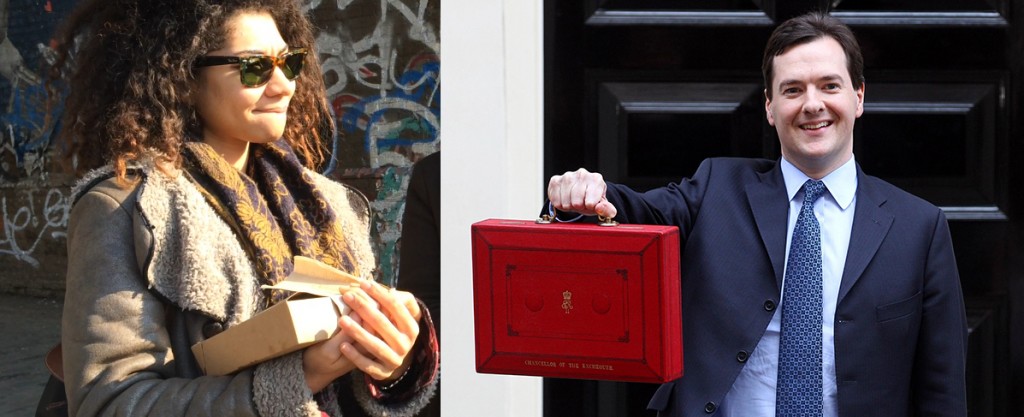
What’s behind the UK budget, and do people get it?
UK Chancellor George Osborne has a £772 billion budget to spend. Yesterday, he explained how he'd do it. But what exactly did he say, and how do people feel about it?
For a quick run-down of what was announced try checking out the Guardian or the Telegraph.
But as well as explaining what was in the budget, we also think it's important to ask: what exactly is a budget? What's the thinking behind it? And how do people feel about it?
So here's our take, and some thoughts from people we asked on the street.
The increase in spending cuts
Perhaps the biggest headline grabber of this budget has been the estimated £3.5bn a year in extra spending cuts by 2019-20.
The UK has a budget because for a long time it has spent more than it has earned - and the government has set itself a target to reverse this within four years.
The problem is that the economy hasn’t been growing as much as was hoped, and neither have people’s wages.
This means there’s been less collected in tax, so the government has less money to splash out. Bearing this in mind, Osborne, the person in charge of the UK’s finances, has decided to reduce spending on public services.
It’s a decision in line with the values of the Conservative Party, who tend to favour a smaller state, lower spending on things like welfare, and believe in the free market, self-reliance and individualism.
These cuts give Osborne the ability to tweak income tax. The threshold at which you start paying income tax will be higher than it was before, and people only have to pay the higher rate of tax (40p for every £1) once they’re earning £45,000.
So, while the cuts will anger some, the reduction in income tax will make others happy. Osborne thinks this is a tradeoff worth making. A cynic might argue that he's doing this to secure the support of the party’s voter base (generally those earning middle to higher incomes).
He also thinks it’s better to make spending cuts now in order to be better protected against any economic trouble in the future. He's expressed fears recently over the state of the global economy, saying Britain faces a ‘cocktail of threats’ in the coming months and years. Yesterday he reiterated this, saying the country needs to "act now so we don’t pay later".
Perhaps his language is the real giveaway here. What do economic ‘storm clouds’ really look like? What exactly is a ‘cocktail of threats’? They're good headlines, but they also help justify the cautious approach to spending that's at the heart of this budget.
So how is all this coming across to people? We spoke to Mohammed, who expressed doubts over how relevant it was to him...

“I’m not an economist. It doesn’t matter to me. They’re doing their job, and I’m doing my job, it doesn’t matter to me at all. ”
Reducing the amount of tax that businesses have to pay
The Chancellor has also made some changes to corporation tax, because he says this will help small businesses to grow.
The changes include measures aimed at tackling tax avoidance and evasion, which has been big news recently, with companies like Facebook and Google coming under fire for not paying enough tax.
The Chancellor is probably responding to these high-profile cases, which have angered a lot of people who feel like they pay a higher proportion of their income in tax than global corporations do.
The plan is for these measures against tax avoidance to raise a total of £12bn. He’s said he’ll use this money to reduce the overall rate of corporation tax to 17% by 2020 to encourage growth amongst UK business.
This policy fits well with the economic efforts to improve growth (remember that?) but also the political efforts to be seen to support small business. Most modern governments prefer to be seen as pro-business, and Conservative governments like to be seen to cut taxes, so this ticks both boxes.
It's worth asking how much this reduced rate of corporation tax will save big companies as compared to the amount they might have to pay once the tax avoidance rules have been changed, but that involves a rather large calculator and a lot of coffee.
Despite his tough talking, it’s unlikely that Osborne would do anything too dramatic to upset big companies and risk them not investing in the UK.
Here's what Jim, Andy and Adam had to say...

“On the face of it, saying that corporations aren’t paying their tax, so we’ll lower it, doesn’t seem right… obviously, it’s so they do pay it, but they probably should have just paid it anyway. ”
Increasing the minimum wage
New levels of the national minimum wage for younger workers were also announced.
For 21 to 24-year-olds it will rise to £6.95 an hour, while 18 to 20-year-olds will see a rise to £5.55 an hour. For 16 to 17-year-olds it will increase from £3.87 to £4 an hour, while apprentices will receive an extra 10p rise to £3.40 an hour. Workers over 25 are already set to receive a minimum of £7.20 an hour from April 2016.
The changes are politically useful in terms of pleasing millions of young voters and future voters. The government has come under fire when it comes to providing for younger people, who face student fees, higher unemployment rates, and increased housing costs, so the Chancellor may have seen this increase as a way to counteract this.
Many workers have also seen a decrease in their wages in real terms in recent years (i.e. if wages stay the same, but prices go up, people can buy less with the same amount of money, so effectively, wages have gone down). According to the Trade Union Congress, average pay in 2015 was worth £2,270 less in real terms than it was in 2008.
Osborne probably hopes the minimum wage increase will help remedy this situation. His critics would probably argue this is too small a step.
Sarah, Soraya and Jess had this to say about the plans...

“It seems archaic to have so many age divisions in the minimum wage, in this day and age. If you’re doing the same job as someone else, and paid less, that’s not fair. When you’re in your 20s there’s really not much difference. ”
Encouraging more people to save
The new ‘Help to Save’ scheme will see the government top up some people’s savings by half. Save a pound, and the government will give you 50p. Those on in-work benefits will be able to save up to a maximum of £50 a month. If they do, they’ll be given an additional £25 a month over a maximum period of four years.
Low interest rates typically discourage people from saving. This is because the value of money decreases over time, so with no interest, savings actually become worth less. This fact has raised concerns about workers’ ability to be financially self-sufficient, especially in retirement.
This could mean big problems for future governments, who may have to fork out more in welfare for an ageing population with no money to look after themselves.
These measures may point to the fact that the government thinks this is a really big problem. Osborne is perhaps attempting to meet a long-term need here with some incentives that sound great in the short term.
The new Lifetime ISA is a good example of this. People can save up to £4000 a year and the government will give a 25% bonus on that amount (so £1000 if you save £4000) until the age of 50. Some critics have already suggested that it may mark an end to traditional personal pensions.
Again, these policies fit with the Conservative idea that people should look after themselves and not rely on the government. The irony is that it looks like the government is still going to have to help them get there, or at least give the impression it will.
We spoke to a Lithuanian business owner (who asked not to be named) about the new Lifetime ISA: "That's crazy! That's good for me, but bad for the government. You will want money, I will want money, she will want money. We'll all want money, and then what? You have to work before you earn."
Finally, Laura, from Italy, had this to say about the UK...

“I understand that people here might think the economy’s not fair in comparison to Northern Europe, but in comparison to Southern Italy, where I’m from, it’s very fair. This is a great country. ”
So what did you make of the budget? Do you think what’s been announced will help people or make life more difficult? What do you think were some of the reasons behind Osborne’s new policies? Share your thoughts below.



